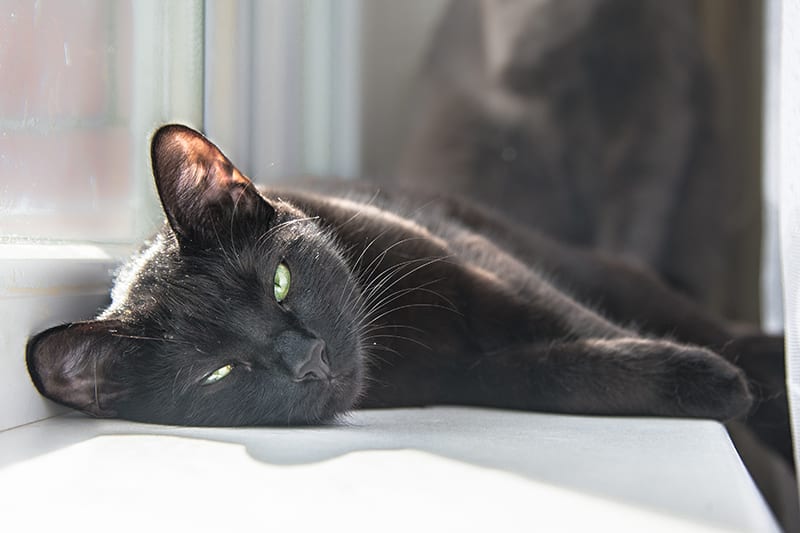What does my cat's liver do?
Your cat's liver plays a fundamental role in their body's ability to convert food into nutrients. Your cat's liver also works hard to filter impurities, poisons and drugs from the blood, synthesize proteins and enzymes, and produce bile which is necessary to carry waste products out of the liver.
What causes hepatitis in cats?
Hepatitis is a liver disorder seen in cats that may be caused by parasitic diseases, viral and bacterial infections, or metabolic conditions (such as hyperthyroidism). If your feline friend develops hepatitis their liver becomes inflamed and its function becomes impaired.
There are two common types of hepatitis in cats, Cholangiohepatitis and Lymphocytic Portal Hepatitis, and each has it's own list of symptoms associated with the disease.
Cholangiohepatitis
Cholangiohepatitis in cats is characterized by the bile ducts and liver becoming inflamed, potentially due to a fungal or bacterial infection. In some cases, cats with this condition also experience digestive disorders such as pancreatitis or inflammatory bowel disease.
Chronic Cholangiohepatitis is characterized by the restricted flow of bile due to inflammation and swelling, possibly leading to caustic bile fluids damaging the liver and biliary ducts. This form of hepatitis may be caused by an immune-mediated infection or diseases such as liver flukes, toxoplasmosis, feline leukemia or feline infectious peritonitis.
Common Signs of Cholangiohepatitis in Cats
- Vomiting
- High fever
- Jaundice (yellowing in the eye)
- Loss of appetite
Lymphocytic Portal Hepatitis
The cause of Lymphocytic Portal Hepatitis in cats is still largely unknown although it is believed that this inflammatory liver disease may be related to thyroid disease or immune system dysfunction. This form of hepatitis is more often seen in older cats with a history of hyperthyroidism.
Common Signs of Lymphocytic Portal Hepatitis in Cats
- Lethargy
- Unexplained weight loss
- Enlarged liver
- Fever
- Diarrhea
- Decreased appetite
How is hepatitis diagnosed in cats?
When you visit the vet they will request a full medical history for your cat and ask a series of questions regarding your kitty's health prior to symptoms becoming evident.
After performing a thorough examination, if your vet suspects that your cat may be suffering from hepatitis, they could recommend diagnostic testing to confirm the diagnosis. Tests often used to diagnose hepatitis in cats include a CBC complete blood count, blood chemical profile, urinalysis and electrolyte panel.
X-rays and/or ultrasound imaging may also be recommended to allow the vet to examine the liver, and a liver biopsy may be performed to provide a definitive diagnosis.
How is hepatitis in cats treated?
The treatment prescribed for your cat’s hepatitis will depend on how severe their condition is. For some cats with hepatitis hospitalization and fluid therapy will be required, along with a number of supplements including dextrose, vitamin B and potassium.
During your cat's recovery, you will need to make an extra effort to keep your kitty warm and comfortable and restrict their activity level.
Fluid buildup in your kitty's abdomen may be treated with medications, which can also be prescribed to treat an abdominal infection, decrease brain swelling, decrease ammonia production and absorption, and control other serious symptoms such as seizures. In some cases, an enema will be performed in order to empty the colon.
To reduce the burden on your cat's liver, switching your kitty to a prescription food and feeding several small meals a day may be recommended. This therapeutic diet will be low sodium and supplemented with thiamine and other vitamins.
Cats that are rapidly losing weight due to lack of appetite may require an intravenous feeding tube to ensure they do not continue to lose muscle.
How do I manage my cat's hepatitis symptoms?
Depending on the underlying cause of your cat's hepatitis your veterinarian may recommend follow-up appointments for ongoing treatments, to check your cat's overall health, and to watch for worsening symptoms.
You will need to monitor your cat's health at home, keeping a close eye on your kitty's symptoms. It is essential to contact your vet immediately if your cat loses weight, their symptoms worsen or their bodily functions begin to deteriorate.
Note: The advice provided in this post is intended for informational purposes and does not constitute medical advice regarding pets. For an accurate diagnosis of your pet's condition, please make an appointment with your vet.
Do you think that your cat may have hepatitis? Contact our Huntersville, Mecklenburg County vets today to book an examination for your kitty. Our vets can diagnose and treat your cat's hepatitis symptoms and work with you to provide your feline friend with the best possible treatment outcomes.
Looking for a vet in Huntersville and Mecklenburg County?
We're always accepting new patients, so contact our veterinary hospital today to book your pet's first appointment.
Related Articles View All
Is there a natural treatment for hyperthyroidism in cats?
Are you concerned about the side effects of your cat's hyperthyroidism treatment? Are there any natural remedies for hyperthyroidism in cats? Find out in today's blog post.
Treatment for Stomatitis in Cats
Feline stomatitis is an oral health condition that causes inflammation and ulcers in your cat's mouth. Here, you will find information about the symptoms of this painful condition and how it can be treated.
Are cat and dog Wellness Plans worth it?
If you have a cherished four-legged friend you may be wondering if paying a Pet Wellness Plan is worth it. In today's post, our Huntersville vets explain what makes Pet Wellness Plans a great deal for pet parents and their furry friends.
Hyperthyroidism Symptoms in Cats
Hyperthyroidism is a condition that occurs if your kitty's thyroid hormone levels become too high. Left untreated, this common condition in cats can lead to some very serious health problems. Our Huntersville vets explain the causes, symptoms, and treatment for hyperthyroidism in cats.

